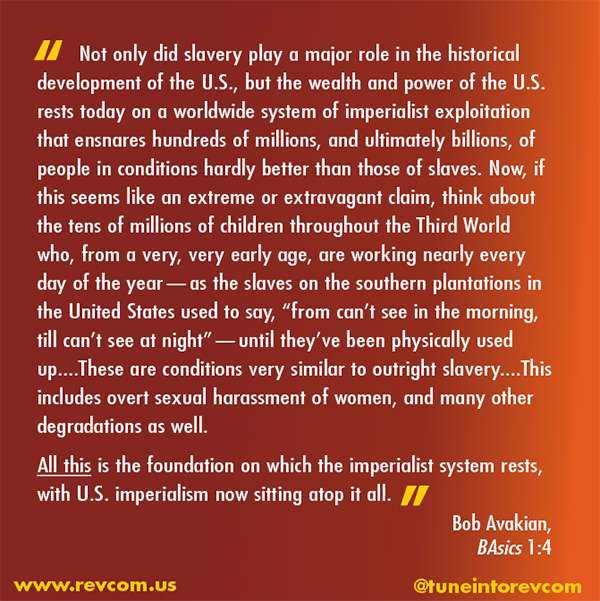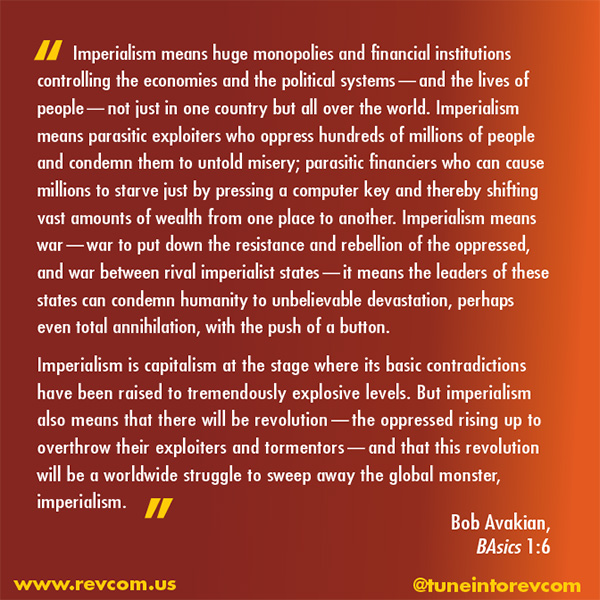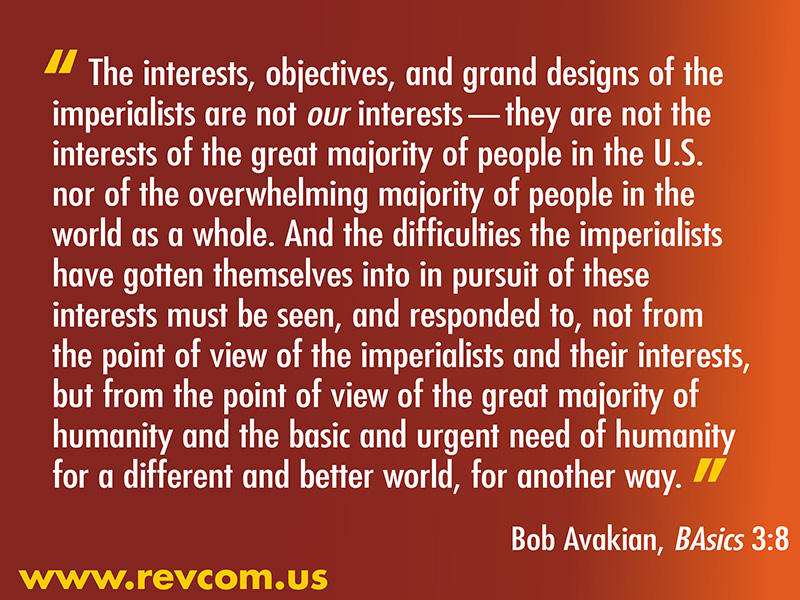Some Basic Points of Orientation on the Murder of Jamal Khashoggi and the Heightened Dangers Internationally
| Revolution Newspaper | revcom.us
On October 2, Jamal Khashoggi was murdered in the Saudi Arabian consulate in Istanbul, Turkey, while there on personal business. He was mobbed in the embassy by over a dozen high-ranking security officials who flew in from Saudi Arabia specifically for this purpose, and Turkish intelligence maintains that he was tortured and dismembered. As we go to press, Saudi Arabia still has not produced Khashoggi’s body.
Jamal Khashoggi had himself been a member of the Saudi “establishment” but ran afoul of the new Saudi ruler, Mohammad Bin Salman (MBS). Khashoggi went into exile in the U.S., where he wrote a column in the Washington Post.
In the nearly four weeks since the murder, Saudi Arabia has changed its story several times—for the first two weeks claiming that Khashoggi had actually left the embassy alive and then, as Turkish intelligence leaked details of what it said was evidence that a team of high-ranking Saudi intelligence officials had murdered and dismembered him in the embassy, gradually changing its story.
During this period, the Trump regime, including Trump himself, has played a reprehensible role, at times downplaying the crime, covering for the regime, then attempting to distance itself, according to how it perceived its imperialist interests. While Khashoggi’s murder puts an exclamation point on what has been a bloody killing season for members of the press, with 47 being killed in the first six months of 2018 alone, during the period directly following Khashoggi’s murder Trump has not only seen fit to continue but to escalate his attacks on the press—complete with stirring up the crowds at his events by pointing to individual reporters—and has gone so far as to congratulate and bray about one of his fascist minion congressmen who actually was found guilty of assaulting a reporter who dared to ask him a question he didn’t like.
This has given rise to a great deal of clash and contradiction, a scramble and potential intensification of the situation in the Middle East and the world as a whole. The Trump/Pence fascist regime had been moving to radically re-order the Middle East and, in particular, move against Iran with aggressive, severe, and absolutely unjust economic sanctions. These sanctions are designed to weaken and destabilize Iran, to aggravate splits in their ruling circles, and to possibly provoke them into resuming a program of nuclear development. The resumption of such a program is only one of the trip wires that significantly heighten the danger of war, with some combination of the U.S., Israel, and Saudi Arabia either potentially using this as pretext to militarily attack Iran, or leading to circumstances that could set a course to further heightened aggression and open hostilities, with danger of a greater war in the region. These sanctions are set to go into effect in early November. To prepare this highly aggressive (and again, highly unjust) move, the Trump/Pence fascist regime tightened the already extremely close alliances between the U.S. and Israel and the Saudis and, in doing so, cast aside certain “international norms ordering the region” (verbal support for a “two-state solution” in which Palestine would be granted some limited autonomy and a [bogus] mini-state by Israel and cancellation of a nuclear deal with Iran). Further, as one commentator put it, the U.S. has moved all its chips into the pot in a massive bet on the very aggressive, repressive, and highly volatile MBS as a force to “stabilize” and “modernize” the highly contradictory, highly fragile Saudi society.
This has now run into potentially significant contradictions. The murder of Khashoggi has both exposed and exacerbated various fault lines (including within Saudi ruling class circles) and enabled other forces representing other interests (for example, President Recep Tayyip Erdoğan of Turkey, himself a fascist) to maneuver. The U.S. faces a dilemma—gamble on sticking with a weakened and severely exposed MBS, or gamble on attempting to replace him... on the eve of a major flash point in their move to reorder the region. It has also served to shine a spotlight on the true character of the Saudi regime at a time when the U.S. is desperately attempting to demonize (the equally oppressive) Islamic Republic of Iran as some kind of pariah.
As we wrote last week, “Saudi Arabia has been a pillar of U.S. domination of the region for decades. MBS has launched an unjust war against the neighboring country of Yemen, slaughtering thousands and bringing millions to the brink of starvation; he has violated international norms in other ways, including kidnaping the prime minister of Lebanon at one point; and he has moved to crush internal dissent. But because MBS has cast himself as a modernizer of a country that is both a linchpin of U.S. domination in the Middle East and is itself extremely unstable, many major forces in the U.S. ruling class, Republican and Democrat alike, have backed him up to now and either supported, or turned a blind eye to, what they are now in some cases criticizing. While some people may be genuinely revulsed at what they have learned about the details of this crime, the differences that are now flaring within the U.S. ruling class over how to handle this crisis ultimately focus on how best to prop up U.S. imperialist interests in the Middle East and preserve the brutally oppressive rule of the Saudi Arabian royal family.”
This does NOT necessarily mean that the threat of greater war in the region, involving U.S., Israeli, and/or Saudi attacks on Iran, has receded; given the way that the Trump regime perceives the necessity it faces, it could well mean an even more aggressive move. Additionally, the fluid situation creates a heightened possibility of miscalculation on the part of one or another power that could lead to war “by accident” that rapidly escalates and assumes its own logic, out of the control of any single power or alliance of powers.
Where do the interests of the masses lie? Definitely NOT with the U.S.—both the sanctions set to go into effect and any other aggressive moves against Iran are and would be an assertion of imperialist domination and must not only be opposed by people in this country, but a spirit of welcoming the defeat of these moves must be fostered. At the same time, the Islamic Republic of Iran (IRI) is a reactionary theocracy in which people have revolted several times in the past few years and in which there is a communist party adhering to the new communism brought forward by Bob Avakian. So in addition to standing firm against and welcoming the defeat of any U.S. imperialist moves in the region, if there should be uprisings in Iran brought on by the increased suffering and chaos imposed by the U.S., people within the U.S. should also oppose all attempts by the U.S. to maneuver and support reactionary forces within those uprisings and should themselves support the genuine revolutionary forces within Iran in their attempts to apply the new communism to the situation, whether it be through participating in the defense of the nation against U.S.-Israeli-Saudi aggression and/or supporting those uprisings of the masses whose main aspect is a just struggle against oppression.
As background to this, we urge our readers above all to review Bringing Forward Another Way, a work by Bob Avakian written over ten years ago but extremely prescient and very relevant in many respects to the current situation. Most critical to this work are not just the various conclusions, but the basic method and approach he uses to analyze the entire situation and the tasks of revolutionaries in that light.




Bringing Forward Another Way is a talk given by Bob Avakian, Chairman of the Revolutionary Communist Party, USA, to a group of Party supporters in 2006 and published in early 2007. This groundbreaking analysis, made during the George W. Bush years, continues to be very relevant, especially in the context of sharpening contradictions centered in the Middle East and aggressive U.S.-led moves against Iran. This work is an illustration of applying the scientific method to approaching international conflicts and understanding social and political contradictions—and identifying where the fundamental interests of humanity lie, providing concrete leadership and guidance for the strategic repolarization for revolution and a thoroughly internationalist orientation. Given the current situation in the world, we urge our readers to restudy this important work or to get into it for the first time. Read more
Get a free email subscription to revcom.us:

Volunteers Needed... for revcom.us and Revolution
If you like this article, subscribe, donate to and sustain Revolution newspaper.

